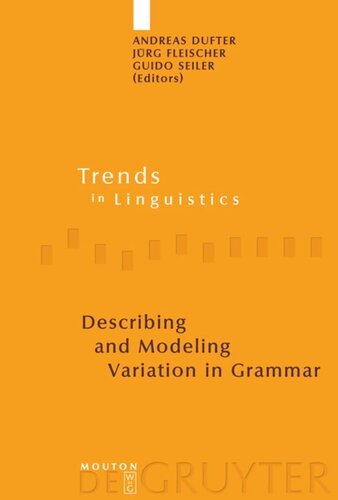

Most ebook files are in PDF format, so you can easily read them using various software such as Foxit Reader or directly on the Google Chrome browser.
Some ebook files are released by publishers in other formats such as .awz, .mobi, .epub, .fb2, etc. You may need to install specific software to read these formats on mobile/PC, such as Calibre.
Please read the tutorial at this link: https://ebookbell.com/faq
We offer FREE conversion to the popular formats you request; however, this may take some time. Therefore, right after payment, please email us, and we will try to provide the service as quickly as possible.
For some exceptional file formats or broken links (if any), please refrain from opening any disputes. Instead, email us first, and we will try to assist within a maximum of 6 hours.
EbookBell Team

4.4
52 reviewsWhile variation within individual languages has traditionally been focused upon in sociolinguistics, its relevance for grammatical theory has only recently been acknowledged. On the methodological side, there is an ongoing competition between large-scale statistical analyses and investigations that rely more heavily on introspection and elicited grammaticality judgements.
The aim of this volume is to bridge the 'cultural gap' between empirical-variationist and formal-theoretical approaches in linguistics. The volume offers case studies that seek to combine corpus-based and competence-based approaches to the description of variation. In doing so, it opens up new avenues for locating and analyzing variability, both at the level of the individual speaker and between speakers of different dialects and generations. The contributions document the plurality of current research into models of grammatical competence that live up to the challenge of variationist data. More specifically, parameter-based (e.g. Minimalist), constraint-based (e.g. Optimality Theoretic), and usage-based (e.g. Construction Grammar) approaches to variation are discussed.
The volume therefore is of interest to a broad public within linguistics, including syntacticians of different theoretical persuasion, morphologists and sociolinguists. While a majority of contributions addresses facets of variation in English and German, the volume also includes variationist studies written by specialists of French, Dutch, Icelandic, and Uralic.